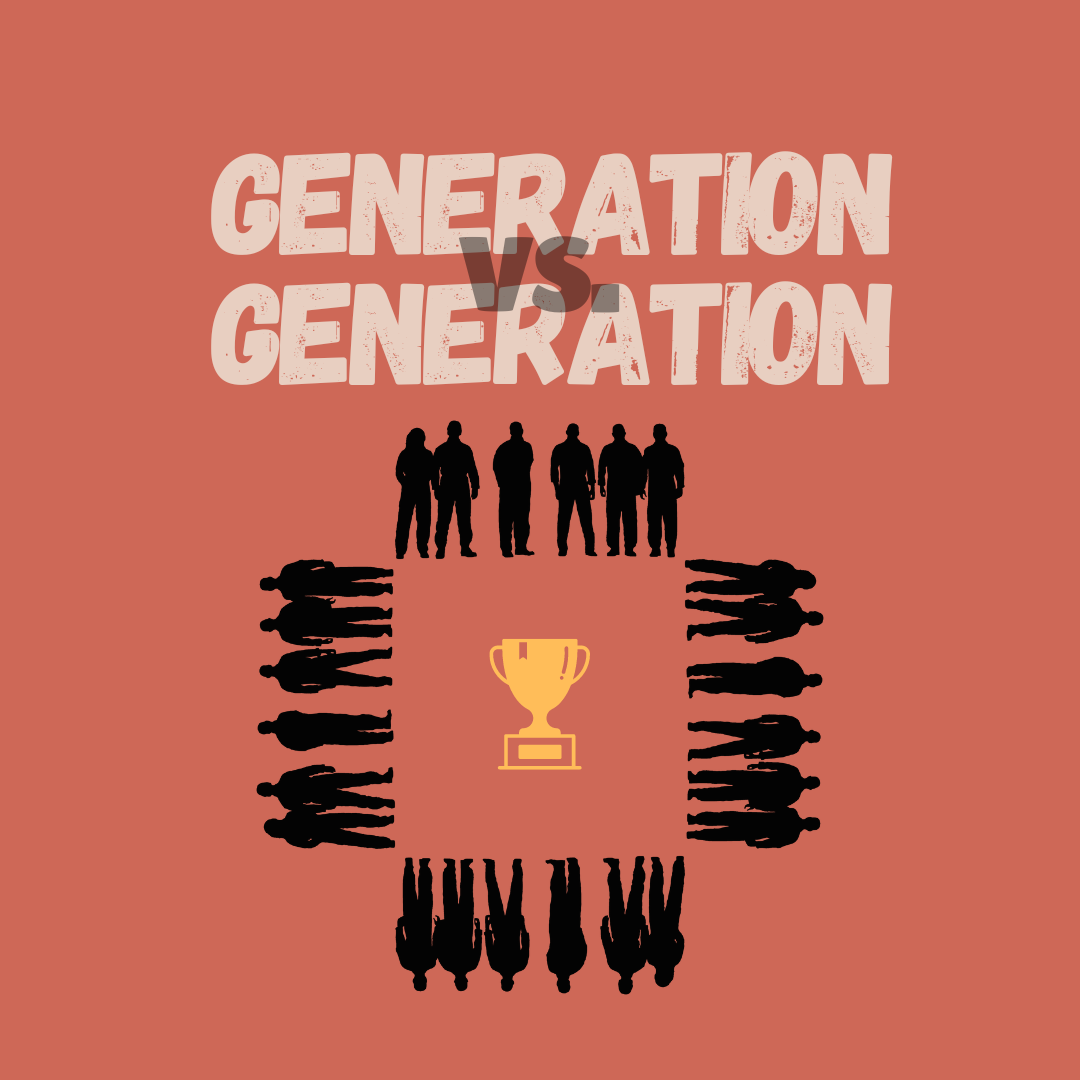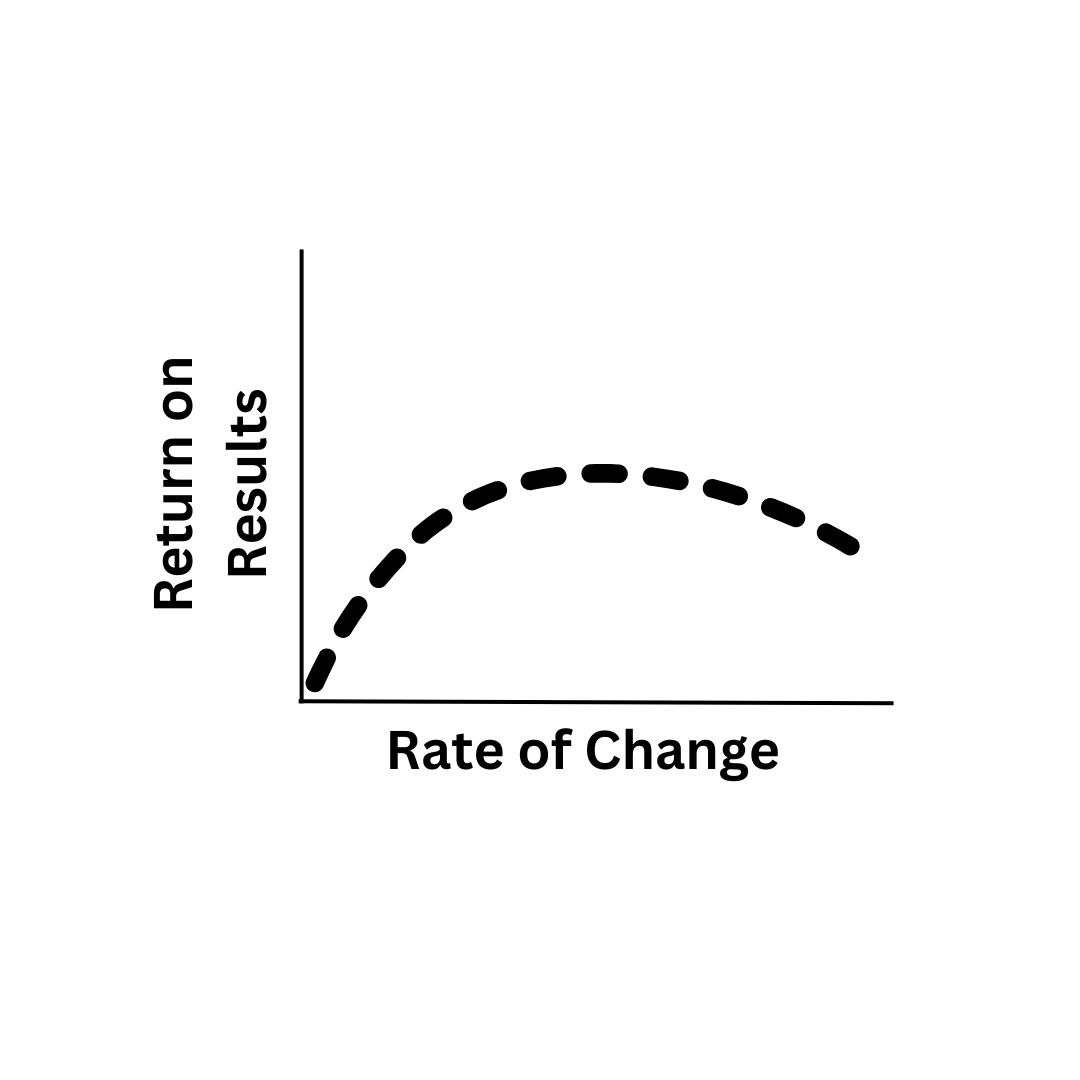Generation vs. Generation - An Impossible War
Generational warfare has infected everyone's perception of right and wrong when dealing with people across generations
Hello 👋
Since I’ve joined the workforce, I’ve felt a noticeable tension amongst people according to what “generation” they identify with. On a recent family vacation, we spent time talking about generational differences between kids and parents.
The conversation can be harmless and playful, but often times the generational conversation is combative and accusatory. This post attempts to address the latter’s harmful narrative.
This post has been in the making all summer! I’m so excited to share it with you, and I hope it convinces you to see the generational conversation different.
Choose Your Generation
This post is about the ongoing generational culture war our society is fighting. To understand this better, we need to answer the who, what, when, when, why, and how of how generations have gotten to this point of conflict:
Who? The living American generations: Silent Generation, Baby Boomers, Gen X, Millennials, Gen Z, and Gen Alpha
What/Why? Each successive generation's way of life is incorrect according to the previous generation.
Where? In-person and online platforms
How/When?
That one is harder to answer.
But we know generational war is raging as the tension has noticeably increased in recent years. If this generational warfare was like a real-life battle, this is what it would look like:
The six living generations are facing each other in a field. The goal is the same for each generation - get to the middle and claim the throne of "greatest generation" (with all due respect to the actual Greatest Generation). Oddly enough, each generation has the same battle plan of standing against each other and firing insults about the different generations' way of life. When a generation's front line falls, they immediately replenish with more people but don't change the battle plan. Thus, no generation can move forward an inch because as soon as one generation finally dies off, the same battle plan is implemented to the next generation rising up.
So what's the solution? How do we end the generational war?
We can't—the battle tactics of criticizing successive generations' ways of life make this war incapable of being won. Much like the theoretical battle we described, no ground is being gained, and the fighting is only getting more violent.
This article is meant to convince you to change the what and why of our generational warfare. We must stop criticizing different generations' ways of life and instead realize the unending burden of change is our battle's true what and why.
Realizing this, there should no longer be any need for personal attacks. Instead, younger generations could extend more grace and understanding to aging generations burdened by the change of society and culture, and vice versa; an older generation could extend more grace to younger generations as they make mistakes trying to keep up in a rapidly changing society.
Then, we must understand that we were not meant to live under the burden of change. When sin was introduced into the world in Genesis 3, the curse that was brought with it has never left. When we realize that we are enslaved to change and that our only hope for things to be made new is through faith in Jesus Christ, then we can begin to free ourselves of generational warfare and instead turn to love for one another through the complexities of change brings to life on earth.
Generations Change
By rough estimation, I've seen the following screen 25,000+ times:
This screen acts as a virtual door. On the other side of this door could be a 300-square-foot studio or a 10,000-square-foot mansion in the form of a company's website or mobile application. For those of us born in Generation Z (I'm using 1995 - 2010), we have spent the vast majority of our time entering and exiting these rooms—even more so than any physical home, place of school, or place of work.
Let's examine how these doors got introduced into my life:
The year is 2010
It's 7:30 p.m., and almost everyone in America is winding down from a long day of work or school. Primetime live cable TV viewership is at its peak, and people across America gather to watch American Idol, The Office, or news networks. But, little does America know that the 50+ year tradition of gathering together around live TV is about to vanish.
At 10:30 p.m., most everyone is getting ready for bed before an early start in the morning. However, for most kids my age, there are still plenty of places to be. No, not somewhere physically like generations before mine would entertain something like sneaking out of the house. My head is on my pillow, just like everyone else's.
As smartphones have penetrated almost every bedroom in America, we unknowingly were bringing in the opportunity to be anywhere we want to be; the only difference is the scene looks like this:
In this scene, time stands still. I remember being in my room in this setting every night… alone… with nobody watching over me… and reality slipping away.
Then, suddenly, my alarm goes off. Other times, when my phone wouldn't make it to the charger, and I would fall asleep during a YouTube video, my mom's voice would be my saving grace to get up because my phone would be dead beside my pillow.
Time to enter back into the real world.
Burden of Change
My lifestyle growing up was drastically different from my parents' generation. Mainly, they didn't have handheld internet devices that gave you access to any information you wanted. Similarly, my parents grew up with inventions like HVAC in their house, while my grandparents did not. Likewise, my grandparents grew up with their families having cars when my great-grandparents did not… and so on.
Am I to assume that my problems and circumstances were worse than, say, what my Dad grew up in? Of course not! In fact, every generation proclaims how rough they had it. Then, a generation turns around and lectures the subsequent generation on how good they have it. I'm sure I'll see the day when Generation Alpha is so skilled in AI, and I gripe and complain at them about how much harder it was to do tasks before AI.
Remember, our generational warfare of determining what generation's way of life is superior is unwinnable. We're all simply trying to navigate the burden of change.
Facebook is the easiest example of the burden of change (seeing as there are 2.9 billion monthly active users). At Facebook's inception, Mark Zuckerberg, a Millennial, created a web application that allowed other college Millennials an easier way to meet and connect with their peers. Flashforward five years to 2010, and it's the most popular social media platform amongst my peers and me, who, not to mention, are 14 years old. Flash forward another 10 years to 2020, and it's the most popular social media platform for all generations except Millennials and Generation Z.
Why did younger generations stop using Facebook as much? The burden of change in the social media landscape forced us to adapt to other platforms. Yet, older generations have yet to be as impacted by the burden of change in the social media landscape as Facebook is still extremely functional for the things they want to do.
So, who's to blame for the burden of change social media has brought on our lives? Millennials?
Then, who's to praise for the positivity that social media has brought to our lives? Millennials?
Both of those questions are impossible to answer. The burden of change is not the fault of a generation - which is arbitrary in the first place, but rather, it's the byproduct of millions of people living amongst each other and constantly changing in the name of "progress."
Your Perfect Placement
Wouldn't it be nice if there was a relief to the burden of change?
There is. It's found in the good news of the Gospel.
The Book of Acts is centered around the early Christian church movement after Jesus ascended into heaven. In Acts Chapter 17, we find the apostle Paul in Athens, Greece. He's not there by choice, as he had just fled from Berea, where Jewish leaders were plotting against him. While in Athens, he's disturbed by the false idolatry in the city. Paul ventures out into the marketplace and begins debating with Greek Epicureans and Stoic philosophers.
An Epicurean worldview is all about personal happiness and pleasure—think of it as eating, drinking, and being merry. In contrast, a Stoic worldview promotes virtuous behavior according to nature—whatever your body "feels" is natural.
Philosophers in that day would be like our business leaders today—like Elon Musk or Mark Zuckerberg. Philosophers set a precedent for the best way to live according to the world, much like business leaders will convince you that their goods and services will enhance your life in your pursuit of happiness.
When Paul presented them with the Gospel of Jesus Christ, the Athenians were very confused about hearing something contrary to their self-promoting worldview and wanted to hear more. Thus, Paul finds himself in a meeting of Athenian elites and delivers this message:
22 Paul then stood up in the meeting of the Areopagus and said: "People of Athens! I see that in every way, you are very religious. 23 For as I walked around and looked carefully at your objects of worship, I even found an altar with this inscription: to an unknown god. So you are ignorant of the very thing you worship—and this is what I am going to proclaim to you.
24 "The God who made the world and everything in it is the Lord of heaven and earth and does not live in temples built by human hands. 25 And he is not served by human hands, as if he needed anything. Rather, he himself gives everyone life and breath and everything else. 26 From one man he made all the nations, that they should inhabit the whole earth; and he marked out their appointed times in history and the boundaries of their lands. 27 God did this so that they would seek him and perhaps reach out for him and find him, though he is not far from any one of us. 28 'For in him we live and move and have our being.' As some of your own poets have said, 'We are his offspring.'
Paul explains to the Greeks that everything you think about and conclude points back to God. The Greeks are so deep in their own thoughts and so desperate for absolute truth that they don't even know what they are worshiping! The philosophers gave opinions on their proposed best way of life, and today, our millions of self-help books support the fact that we're still searching for someone to solve our life's problems.
Actually, this is what different generations of people, nations, tribes, and languages have been trying to solve since the beginning of creation.
Yet, Paul is telling the Greeks that you don't have to be burdened by change to find the best way of life for your current times. Jesus Christ has come and settled any debate through His death and resurrection. He has given us the way for complete fullness of life in this life AND the life to come.
Through this fullness of life in Jesus, as Paul proclaims to the Greeks, we can have confidence that we are uniquely and perfectly placed by God right where we should be in hopes that we will seek Him and find Him. So, for you and me, we can believe that God placed us in our "generation," not so we could endlessly try to solve the burden of change, but so we would seek God and find Him.
What an absolute relief that is.
Change Wisely
The immediate rebuttal would be, "Davis, we can't just dig our roots in an Amish-style living and completely neglect any aspect of change in the world." To that, I would agree.
Unfortunately, we still live under the burden of change we have discussed. Even though we can have confidence in Jesus Christ, we still find ourselves living amid exponential change.
I wrote a series of posts last year on digital addiction (Digital Addiction introduction and Part 1). The purpose of this ongoing series was never to condemn anything but to better understand how we got to our digital world and examine what ways it's controlling my life. I re-discovered so much good that our digital world has brought. I've, without a doubt, come to a deeper faith because of so many wonderful online resources.
However, the opposite could just as easily be true, as there are many glaring negatives to our world rapidly turning into a digital world. We've chosen the path of digital encounters over physical face-to-face encounters, and future generations will only know these digital encounters. One has to wonder if we are heading toward an epidemic because of the negative isolation effects of our digital world.
It's truly a "both/and" dilemma.
So, how do we approach the burden of change we are all under while still having confidence in Christ?
Distractions
Imagine it's Monday (really stretching your imagination here). You're working in person with your team, who is having a good year for the company. Team morale is high, so everyone buzzes into the afternoon weekly meeting, laughing over stories of the weekend. The manager finally gets the meeting going, saying, "Alright, everyone listen up." The next four words out of the manager's will make any employee shake to their core:
"We are changing systems."
The team emits a collective groan like a child going to timeout because they know this means their next several months will involve learning, adapting, and implementing new workflows. Any change in a company's process is made with a long-term value reward in mind, but that is not a certain outcome. The change could be disastrous without a cohesive plan of everyone pulling in the same direction.
But until those long-term results can be determined, what is the immediate effect of the system change? It's a distraction.
(Sorry to my actual work team, who just threw their phone across the room after reading that because of the changes I've implemented, but that's the reality of the change in the short term.)
Thinking back to the introduction of this post, it's hard to pinpoint when generational warfare began, but I believe that highlights the effects that change has on us. It's disorienting and distracts us from our ultimate reality.
Our Western American way of life is sold on adopting every change, and when we choose to change everything, we continue to poison our way of life with an endless number of distractions.
That's why a key to navigating the burden of change is viciously deciding what you are willing to change.
Overcoming Distractions
When we examine change in the form of moral right and wrong, the ironic part is that evil itself has never changed. The most straightforward example of this is going straight to murder. If someone makes the tragic decision to kill someone, just because the weaponry has significantly advanced doesn't mean the evil intention has changed. The same can be said of stealing - if someone steals another person's identity online, that's the exact evil nature of someone stealing another person's physical possessions.
Evil has never changed, but Satan's playbook to submit us to evil is adding pages by the day. Genesis Chapter 3 states, "Now the serpent was more crafty than any other beast of the field that the Lord God had made…" Today, Satan is still using his deception, and we're sadly obliging him.
Take artificial intelligence (AI) for instance. That's a noticeable change everyone must adapt to, right?
Yes, and the evidence for that is this is my second mention of AI in an article that is not remotely about AI. We've gone off the deep end of idolizing AI. It's distracting us from God, saying, "I'm sovereign over some algorithm giving you an apple pie recipe or structuring your data for you (two things I've recently used AI for)" (Daniel 4:35).
Speaking of Daniel, this book in the Bible is one of my favorites. It tells the story of a man who stayed faithful to the Lord amidst the crazy change around him.
Daniel's life begins as the Babylonians overthrow Jerusalem and take the Israelites as exiles. The king of Babylon sought any Jewish boy who was "...showing aptitude for every kind of learning, well informed, quick to understand, and qualified to serve in the king's palace" (Daniel 1:4).
As Daniel is being examined for this service to the king, he chooses not to partake in various activities that he knows are against God's commands. A few palace guards warn Daniel of the consequences, yet he still seeks the Lord. The outcome is that Daniel is the most presentable and fit to serve the king, and God "gave knowledge and understanding of all kinds of literature and learning. And Daniel could understand visions and dreams of all kinds" (Daniel 1:17).
The rest of the book involves Daniel using this gift from God to advise and interpret various kings' dreams. Because of his gift, he would be thrown into a fiery furnace and a lion's den. But God honored his faithfulness by delivering him from his enemies!
Daniel was not passive in his understanding of the world and all the change that was known at that time; he was actively using it to fulfill God's calling in his life.
How do we apply Daniel's example to our lives today?
Daniel would know how to use AI and probably be skilled in it, but it would not be an idol in his life before God. It would simply be a tool he could use to show God's glory. We overcome the burden of change's distraction by deciding what to change to and not making the change an idol but a new tool to show God's glory.
Generational Victory
By now, we can see that our generational warfare is not about generations at all. This is not a me vs. you war that we have made it to be. No human generation has ever saved the world, and none ever will, which brings us back to searching for a Savior who can save the world.
When we fight generational warfare, we refuse to accept that we aren't in control. When you aren't in control, the natural reaction is to fight to be in control.
I'm here to tell you to put your guns down, sheath your sword, unclench your fist, delete that tweet, and loosen the tension in your neck.
Jesus has already won the battle. He defeated sin and death at the cross and then resurrected back to life so you and I can come to faith in Him. The only thing in life that's not under the burden of change is Jesus waiting for you to run into his merciful arms and receive His love and grace - regardless of how undeserving you think you are of it.
Because the truth of the Gospel is that Jesus wins, Satan wants nothing more than to keep distracting you from the fact that he has been defeated. Satan wants us to continue to push away from God in the name of "progress" on earth. If he creates a little conflict in the meantime, pitting people against each other disguised as "generational warfare," then that's all the better for him!
As the complexity of change in our world only increases, may we continue to allow God to show us the truth in the simplicity of His Gospel. Join me in resting on the fact that the battle is already won!
References:
The Bible





